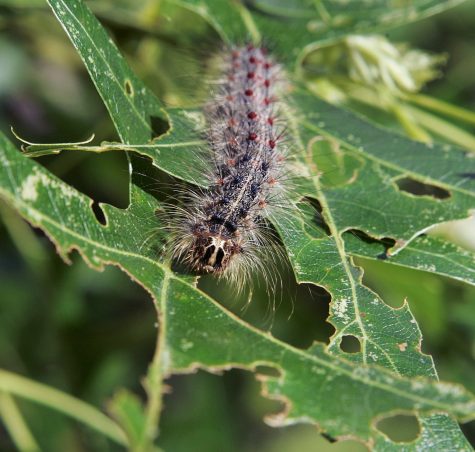
A gypsy moth caterpillar crawls along partially eaten leaves of a tree.(AP Photo/Mel Evans, File)
BARNSTABLE – The gypsy moths are back again on Cape Cod this summer and are doing their damage on the Outer Cape.
Back-to-back dry springs are the cause of the infestation as the lack of moisture has stopped a parasitic fungus from growing and stopping the spread of the insects.
The presence of the moth is reminiscent of the early 1980s before the fungus was introduced in Connecticut in the latter half of the decade which quickly spread into the region.
Last year, Cape Cod saw about 14,000 acres of defoliation, mostly on the Upper and Mid Cape, according to Larry Dapsis, an entomologist with the Cape Cod Cooperative Extension.
Dapsis said that number more than doubled to about 34,000 acres.
“The Outer Cape – very, very hard hit from eastern Harwich and Brewster up to Truro,” Dapsis said.
The lack of foliage and hot, dry conditions are causing concerns for some officials in regards to possible wildfires.
“When you open up the forest canopy and have direct sunlight going down to the forest floor and you are drying things out, what is the increased risk of wildfires?” he said. “That’s actually been front of mind for a number of us.”
Dapsis said there will probably be a lot of eggs hatching next spring around the third week of May.
“If we don’t get the rainfall at the right time and activate the fungus, people need to be prepared to probably contract a service to protect the trees that they consider valuable,” Dapsis said.
To prevent the moths from causing problems on the Cape for the third straight year, Dapsis said there needs to be a wet spring moving forward.
“This is Mother Nature in action,” he said. “So bear with it. Hopefully, weather will cooperate with us next year.”
Dapsis said if the weather does cooperate and the gypsy moth population is kept under control next year, the focus can return to winter moths and deer ticks.
By BRIAN MERCHANT, CapeCod.com NewsCenter
























Speak Your Mind